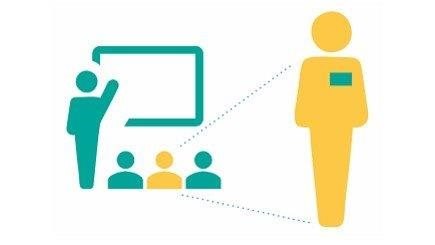4. Deployment in practice
Learners should be supported to grow and develop their confidence in ‘real-world’ settings.
Learner outcomes:
- Patients' preferences balanced with their best interests
- Consistent approach achieved, despite many variables in settings
- Learners have the confidence to address awkward situations and manage friction in a team
- Awareness of how to work collaboratively within a multi-disciplinary team to ensure holistic patient care
- Learners are aware of where to seek support and the formal resources available to them
- Recognition of the importance of reporting concerns and handling inappropriate behaviour or misconduct with professionalism.

Ideas for supporting learners:
Keeping up contactReflective feedback sessions: Allow time for reflection on practical experiences, through face-to-face discussions or reflective journals. Benefit: Encourages learners to consider challenges they faced while working in a team, highlighting how they overcame or could have handled them differently, resulting in self-improvement. | Tackling bad behaviourHandling workplace challenges: Provide learners with advice on how to seek support if the behaviour of other colleagues is affecting their learning experience. Benefit: Ensures that learners recognise when the behaviour of other's is not appropriate, and empowers them to address bad behaviour early and in the right way. | Knowing your rightsReporting concerns: Ensure learners are informed of their rights, including the right to a safe and respectful learning environment, and appropriate reporting channels (including whistleblowing procedures). Benefit: Clear guidance, accessible reporting mechanisms, and reassurance that concerns will be taken seriously without fear of reprisal will help the learner feel supported. | Managing upwardsTaking responsibility: Help learners to take ownership of how they work with their supervisors and practice staff (understanding expectations, keeping them informed about progress, asking for feedback regularly), and show initiative in their learning. Benefit: Building a professional and respectful relationship with supervisors, fosters a supportive and positive environment. |
At this stage:
- Ensure supervisors recognise that they will be expected to support students with MDT working and incorporate this into supervisor training
- Design placements to allow students to observe and engage in MDTs, including interactions with secondary care and patient support organisations
- Allow the opportunity for training to highlight the importance of triage and delegating tasks correctly
- Encourage mutual respect and trust - support learners to value whole-team collaboration, and individual expertise and contributions
- Provide each learner with a quick reference guide containing information on who they can contact whilst on placement if they need additional support in particular areas
- Provide CPD opportunities for practitioners to address unconscious bias and improve team communication
- Ensure support mechanisms are clearly, actively and regularly articulated.